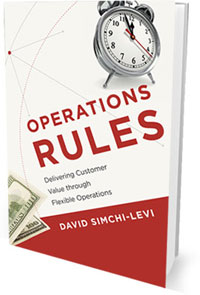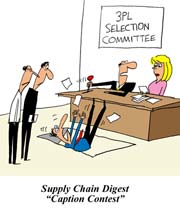The Seven Habits of Highly Effective Supply Chains 2012
You may not have seen the news, but Stephen Covey, author of "The Seven Habits of Highly Effective People", died tragically this week at the age of 79.
I say tragically because his death July 16th actually was the result of injuries he suffered in a bicycling accident in April.
The Seven Habits was first published in 1989, and made Covey a superstar. It is hard to overstate the impact the book had over the next few years, when Covey and his ideas seemed almost ubiquitous, and they have remained very popular to this day.
| GILMORE SAYS: |
"It doesn't mean the most highly effective supply chains are necessarily technology pioneers, but they are most often fairly early adopters."
WHAT DO YOU SAY?
Send us your
feedback here
|
They key concept of the book can in a sense be summed up as this: too many people focus on what is "urgent" (whether it be in their business or personal lives) and not on what is "important." We must make changes to reduce the need for "urgent" activities so we can spend more time on the important ones. You will become much more effective if you can make this change.
That led later to Covey books on "The Seven Habits of Highly Effective Companies" and other spin-offs, and to hundreds if not thousands of friendly rip-offs of the concept. You can find an article or paper on the "The Seven Habits of Highly Effective..." on just about every business topic on the planet, including supply chains, as I fully realize. I myself even wrote a white paper in about 2001 on "The Seven Habits of Highly Effective Supply Chain Execution."
I found several more in a quick web search, including a twist by my friend Dr. Larry Lapide, now of MIT, who I guess thought seven was too many and published an article on "The Four Habits of Highly Effective Supply Chains" in 2005. I will have to ask him what happened to the other three.
So, with that long-winded introduction, thought it was apprpriate for an updated list of the seven fresh habits for SCM in 2012. In my recent experience, effective supply chains embrace the following habits:
1. They have a Written Strategy that Is Regularly Updated: It may sound basic, but it is surprising how few supply chain organizations actually develop a written strategy. Sure, they have budgets and objectives and all that, but those things are not the same thing as a strategy.
What is a supply chain strategy? Well, that is actually a more complicated question than you might think, and I plan to address that in more detail soon, but at its core it is a plan, and one that recognizes the core of strategy is making explicit decisions about how always scarce resources will be allocated over time. I have even seen supply chain leaders regularly develop SWOT (strengths, weaknesses, opportunities and threats) assessments for their organizations to good effect.
2. They Put Alignment with the Business as a Constant Priority: In general, there is much improved alignment between supply chain and the business than ever before, driven by Sales and Operations Planning (S&OP) and the obvious benefits companies see from such alignment. But too often companies can lose track of that imperative, under their own operational pressures and other factors.
More companies might want to embrace the practice that now retired Nick LaHowchic started as head of supply chain for The Limited Brands, in which its shared supply chain organization developed specific service level agreements with the different business units to ensure alignment on goals and what services would be provided at what costs. That helped to ensure no SBUs were under - or over - served.
3. They Focus On Talent Management: Let's face it, it is difficult to focus on development of people and their skillsets in the face of the daily operational pressures of running supply chain. But to be highly effective, it has to be done - and a relatively few number of companies do it well.
That means everything from regular assessment of talents and people across the organization; how managers, especially promising ones, are rotated through job assignments; investment in real training and skills enhancement; succession planning, and more.
Just a few years ago, for example, PepsiCo found that when they looked at succession plans for higher level supply chain positions, just a few very talented managers were named as the successors for dozens of spots.
Of my seven, this is probably the one that most directly falls in the "Important but not Urgent" category.
4. They Build Fact-Based Cultures: There a lot of engineering types or engineering-like thinkers in supply chains, but it is surprising how few companies have really embraced a deep fact-based cultures in their organizations.
And doing this comes from the top. My friend Doug Baker, VP of Operations at totes Isotoner, is one such practitioner, someone who constantly challenges assumptions and drives relentlessly for unearthing the real facts. Last year, I was actually kind of blown away by my time spent at electronics and MRO-type items distributor WESCO, where Larry Mosier, VP of Distribution Centers & Transportation, has clearly built an environment where managers simply drive towards fact-based analysis at a level rarely seen in support of impressive continuous improvement success in logistics.
It is a tangent to being fact-based, but at the JDA user conference, I had an interesting dinner conversation with one consumer packaged goods company who told me their teams can very quickly assess whether a given retailer is "detail focused" or not when approached with ideas for collaboration or joint supply chain improvement programs. I suspect the non-detail oriented companies don't have fact-based supply chain cultures either.
5. They are Savvy Users of Technology: There are exceptions, probably notably Toyota, but in general I am convinced highly effective supply chains are more aggressive - and smarter - users of technology.
Our joint supply chain studies each year with Gartner support that (top performers more aggressive technology adopters), supported by my anecdotal experience. It doesn't mean the most highly effective supply chains are necessarily technology pioneers, but they are most often fairly early adopters, because they recognize that most of the competitive advantage comes fairly early in the technology lifecycle - once a technology has matured, all you are doing is playing catch up.
Effective supply chains also more regularly assess what technology and capabilities they really have, what capabilities/modules they may own but not be using, and regularly assess whether there are other capabilities not being used in technology they are running now that could drive value. More on all this soon also.
6. They are Smart about Collaboration: Effective supply chains realize that collaboration is increasingly critical for taking supply chains performance to the next level. But effective supply chains view such opportunities for collaboration with a savvy eye. As Procter & Gamble exec Jim Flannery told me a few years ago, (paraphrasing) "There is a cost to trading partner integration and collaboration. You have to really determine the ROI." May sound obvious, but not all companies are that rigorous.
Kraft Foods rolled out a program a few years ago in which it approaches retailers relative to collaborative opportunities - but with the condition that there is defined gain sharing from the efforts. Kraft identifies the (unrecognized) opportunity, the program is jointly implemented, and the rewards shared equitably. My friend Dr. John Gattorna has said too many companies waste time and effort trying to collaborate with companies that don't want to collaborate, and I completely agree. Effective supply chains understand this.
7. They Organize for Innovation: Virtually everyone it seems today understands the need for business innovation to drive success. That applies to supply chain as well, at multiple levels, in terms of both innovation in supply chain processes and strong and rapid (this is the key) support for business innovation.
A couple of years ago, P&G's Jake Barr said the company's supply chain had specific (and aggressive) targets for driving revenue growth through opening up new routes to market. I know some companies that specifically track internal innovation, and set targets for such advances. More should do the same.
I would argue very few companies do all of this well. But leaders are close.
I'll update this list every few years. Stephen Covey - rest in peace.
|













